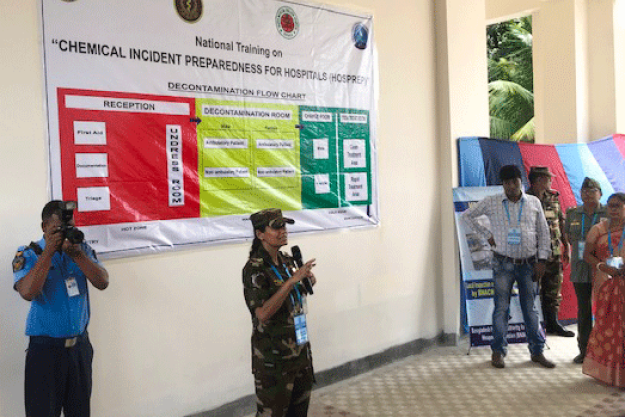
THE HAGUE, Netherlands — 8 August 2019 — Bangladesh showcased significant improvements to its emergency management capacity during the Chemical Incident Preparedness for Hospitals (HOSPREP) training in Dhaka, held from 22 – 24 July.
Dhaka Medical College Hospital (DCMH) and Combined Military Hospital-Dhaka (CMH-Dhaka) hosted the national training in coordination with the Bangladesh National Authority (NA) and the Organisation for the Prohibition of Chemical Weapons (OPCW).
The training, which covered the fundamentals of hospital emergency planning and management of chemical casualties, included a tour of newly-constructed patient decontamination and casualty management facilities of the two hospitals. Domestic funding and management of these initiatives was spurred by the hospitals joining the OPCW HOSPREP Project in 2018.
Chairman of the Bangladesh National Authority, Lieutenant General Mahafuzur Rahman, stated: “This training marks the beginning of a long and arduous journey to build the capacity of Bangladesh hospitals to help chemical victims. We are starting almost from scratch but are determined to press on with the HOSREP initiative till full functional capability is developed. We are confident that the OPCW and national stakeholders will continue supporting us during the process.”
Furthermore, Acting Director of the OPCW International Cooperation and Assistance Division, Mr Shawn DeCaluwe, noted: “The participating hospitals from Bangladesh have exceeded all expectations. The project tasked participating facilities to set modest goals and focus on incremental change for the better, but what DCMH and CMH-Dhaka have implemented is anything but incremental. It’s a credit to each facility and of course to the National Authority of Bangladesh to the Chemical Weapons Convention.”
HOSPREP, inaugurated last year in Ankara, Turkey, is a multi-phase international initiative promoting self-directed national capacity building in the public health sector. Bangladesh is the first OPCW Member State to have delivered concrete results in the project’s framework.
Further national iterations of the HOSPREP Project are planned in Malaysia and Kenya in October and November 2019. Nominations for a new HOSPREP cohort will be solicited in early 2020.
Background
As the implementing body for the Chemical Weapons Convention, the OPCW, with its 193 Member States, oversees the global endeavour to permanently eliminate chemical weapons. Since the Convention’s entry into force in 1997, it is the most successful disarmament treaty eliminating an entire class of weapons of mass destruction.
Over 97% of all chemical weapon stockpiles declared by possessor States have been destroyed under OPCW verification. For its extensive efforts in eliminating chemical weapons, the OPCW received the 2013 Nobel Peace Prize.
